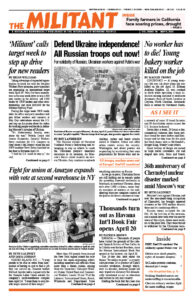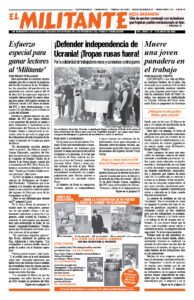When Carl Wayne Buntion was executed by lethal injection at the state penitentiary in Huntsville, Texas, April 21, his lawyers said it violated the Eighth Amendment to the Constitution prohibiting “cruel and unusual punishment.” The 78-year-old prisoner was confined to a wheelchair and was suffering from hepatitis C, cirrhosis, arthritis and other medical problems.
Buntion was sentenced to death more than 30 years ago. He was the oldest death-row inmate in Texas. He was sentenced in 1991 for shooting and killing Houston police officer James Irby during a traffic stop the year before, when he was on parole.
As he lay on the gurney in the death chamber, Buntion’s spiritual adviser, Pastor Barry Brown of the Ministry at the Gates program, joined him aloud in prayer while holding his hand on Buntion’s ankle. This was the first time that physical contact and free speech by a prisoner’s own spiritual adviser was allowed in recent years during an execution in Texas, a victory for the right to worship.
It came after a U.S. Supreme Court 8-1 decision March 24 in favor of another Texas death-row prisoner, John Henry Ramirez, who had sued to allow his own pastor, Dana Moore of the Second Baptist Church in Corpus Christi, the right to pray aloud and touch him when he is executed.
After this, the execution of Ramirez — who did not appeal saying he had committed a horrible crime — was rescheduled to Oct. 5 by the office of the district attorney in Nueces County. But then, unexpectedly, Mark Gonzalez, the county’s district attorney, filed a motion April 14 withdrawing the death warrant. He cited his “firm belief that the death penalty is unethical and should not be imposed on Mr. Ramirez or any other person.
“For a while now I’ve stated that I don’t believe in the death penalty,” he said. “My office is not going to seek the death penalty anymore.”
Gonzalez was one of almost 100 elected prosecutors, state attorneys general and other officials who signed a letter early last year to President Joseph Biden urging an end to the death penalty in the U.S., a reflection of growing opposition among working people.
In a Facebook Live video, Gonzalez urges people to reconsider the pros and cons of the death penalty, stressing the “disproportionate impact capital punishment has on people of color, people from low-income backgrounds, and people with intellectual disabilities.”
‘Choose’ electric chair or firing squad
In yet another death-row decision, the South Carolina state supreme court stayed the April 29 execution of 57-year-old Richard Bernard Moore, one of 37 prisoners on the state’s death row. This would have been South Carolina’s first execution by firing squad after spending $53,000 over nine months to refurbish the death chamber in Columbia to accommodate the sharpshooters.
Moore was sentenced to death in 2001 for the 1999 killing of convenience-store clerk James Mahoney in Spartanburg. Moore’s lawyers are appealing the method of execution and his sentence.
They are arguing that both electrocution and the firing squad — the state’s current two “choices” for inmates to make for their execution — are “barbaric.” While Moore “chose” a firing squad, he maintains he was forced into that decision. He is also asking a federal judge to consider whether both methods are “cruel and unusual” punishment.

